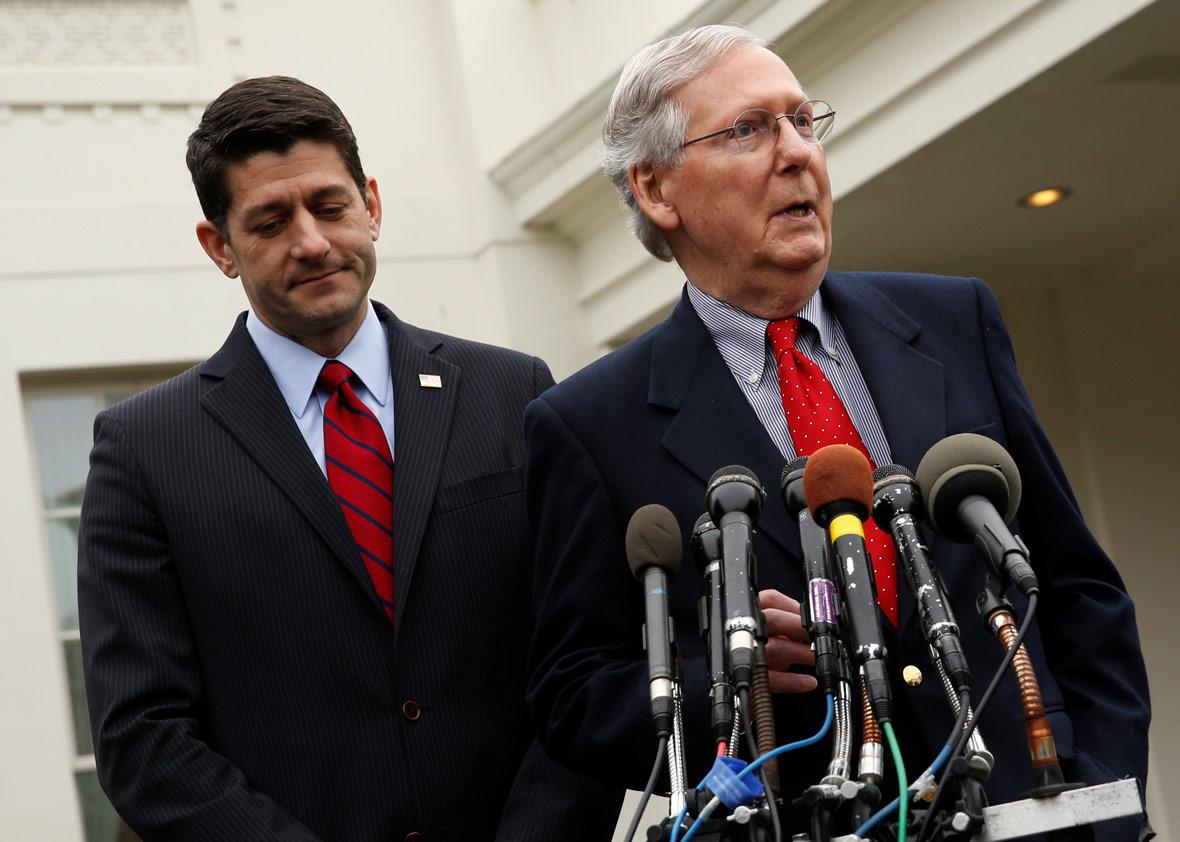It is difficult to overstate the sheer unpopularity of the American Health Care Act, the Republican Party’s plan to “repeal and replace” the Affordable Care Act. And it’s not hard to understand why the bill is so unpopular. What’s mystifying is why Republicans insist on passing it, acting as if there won’t be political consequences for a plan that promises pain for tens of millions of Americans.
At Obamacare’s least popular moment, in the fall of 2014, 56 percent of Americans held a negative view of the law, versus 37 percent who approved. Compare that with the Republican version of the AHCA that passed the House of Representatives in early May. In a recent survey from CBS News, 59 percent of Americans disapprove of the GOP proposal, versus 32 percent who approve. A Roper Center analysis shows the proposal with just 29 percent support, making it the most unpopular piece of legislation Congress has considered in decades. And its unpopularity isn’t just a function of blue states like California, New York, and Illinois—there is no state in the union where a majority of voters support the bill.
If the AHCA ends up improving outcomes for Americans—if it delivers affordable health insurance or protects families from medical bankruptcy—it might recover some popularity in the implementation, as was true with the Affordable Care Act, which now has majority support. But we know from the Congressional Budget Office’s evaluation of the House bill that it would increase the number of uninsured by an estimated 23 million people; there are no signs the Senate version will be any less damaging. What’s more, the AHCA may upend the employer health market as well; its deregulatory measures could result in lifetime limits and substantially higher out-of-pocket costs for people who receive insurance through work. The universe of people potentially left worse off by the Republican bill is close to a cross-section of the American public: salaried employees, ordinary workers who rely on the Obamacare exchanges, and the millions of low-income people, children, elderly, and disabled Americans who rely on Medicaid.
Under most circumstances, this would be the ballgame. As a general matter, lawmakers don’t pass hugely unpopular legislation that might harm constituents in such a direct way. It’s easy to say that, for House and Senate Republicans, their “constituents” are those wealthy Americans who receive huge tax cuts under the bill. Still, it’s also true that winning donors isn’t the same as winning elections. Politicians don’t need to value the public interest to reject a bill like the AHCA; a survival instinct should be enough.
Which gets to what’s mystifying about the present situation. If the health care bill becomes law, there’s every indication the Republican Party will suffer for passing it. It is already responsible for a substantial and so-far enduring decline in the president’s approval rating, and it is fueling grass-roots opposition to the already-unpopular Trump administration. If Republicans face an increasingly difficult environment for the 2018 general election, it is at least in part because of the AHCA. And yet, Republicans are intent on passing the bill. Senate Majority Leader Mitch McConnell has cannily adopted an unprecedentedly secretive process meant to insulate the proposal from criticism and expedite its passage. There have been no hearings and no debate. The plan, as it exists, is for a one-week period of public input before Congress votes.
It’s likely that Republicans know the bill is unpopular and are doing everything they can to keep the public from seeing its contents before passing it. As we saw with the Affordable Care Act, the longer the process, the greater the odds for a major backlash. But this presupposes a pressing need to pass the American Health Care Act, which isn’t the case, outside of a “need” to slash Medicaid, thus paving the way for large-scale, permanent tax cuts. The Republican health care bill doesn’t solve any urgent problem in the health care market, nor does it represent any coherent vision for the health care system; it is a hodgepodge of cuts and compromises, designed to pass a GOP Congress more than anything. It is policy without any actual policy. At most, it exists to fulfill a promise to “repeal Obamacare” and cut taxes.
Perhaps that’s enough to explain the zeal to pass the bill. Republicans made a promise, and there are forces within the party—from hyperideological lawmakers and conservative activists to right-wing media and Republican base voters—pushing them toward this conclusion. When coupled with the broad Republican hostility to downward redistribution and the similarly broad commitment to tax cuts, it makes sense that the GOP would continue to pursue this bill despite the likely consequences.
But ultimately it’s not clear the party believes it would face those consequences. The 2018 House map still favors Republicans, and the party is defending far fewer Senate seats than Democrats. Aggressively gerrymandered districts provide another layer of defense, as does voter suppression, and the avalanche of spending from outside groups. Americans might be hurt and outraged by the effects of the AHCA, but those barriers blunt the electoral impact.
The grounds for political combat seem to have changed as well. If recent special elections are any indication—where GOP candidates refused to comment on signature GOP policies—extreme polarization means Republicans can mobilize supporters without being forced to talk about or account for their actual actions. Identity, for many voters, matters more than their pocketbooks. Republicans simply need to signal their disdain—even hatred—for their opponents, political or otherwise. Why worry about the consequences of your policies when you can preclude defeat by changing the ground rules of elections, spending vast sums, and stoking cultural resentment?
It seems, then, that we have an answer for Republicans insist on moving forward with the American Health Care Act. Because they can. And who is going to stop them?
